- Home
- Bryce Courtenay
Brother Fish Page 16
Brother Fish Read online
Page 16
Now that the Chinese, faced with a Western army, had shown their true colours, we could happily go ahead and win the war as quickly as possible. The 8th Army was to start its push for the Yalu River, the wide flowing stream that, together with the Tumen River, slices across the top of the Korean peninsula and divides China from North Korea.
The Allied advance got away with every division taking up more or less where they’d left off. The Commonwealth Brigade was sent into reserve and this time I don’t think we were too indignant – the further north you went, the colder it got. Going into reserve meant moving to the outskirts of Pakchon and finding buildings to occupy where we would be warm and able to set up kitchens where hot food was served and, perhaps most glorious of all, where we would have access to hot water and bush showers. The blokes called it Operation Defrost, and I can still clearly recall the feeling of standing under a sprinkle of hot water and lathering myself with actual soap all over my body. The shower head was made from a jam tin with holes hammered in using a six-inch nail, but there never was a trickle from above more luxurious. Some enterprising photographer took a picture of me standing under the shower and also a close-up of the jam-tin shower head. Gloria was over the moon and the pic had pride of place in her by now burgeoning war journal. Fortunately she also pasted in the photo of the shower head. Many years later, when I built the big house on the island, I had it copied, using an IXL jam tin that I had chrome-plated and placed in the shower recess in my bathroom. Hardly a morning goes by when I don’t look up, as the hot water splashes over my face, and remember.
The day after we went into reserve happened to be Thanksgiving Day and the Americans, always generous, saw to it that their allies had rations that featured turkey and ham, and Christmas pudding for good measure. They also included several truckloads of American beer. But the new Budweiser plant in Newark, New Jersey, hadn’t calculated on the Korean winter, and a large part of the load arrived in frozen and broken bottles. Australians abhor in particular wasting the amber liquid and we soon found a way of gently removing the glass, which broke clean, to be left with a giant beer ice block. It was a very strange way to get pissed – nevertheless, a great many blokes managed to do so very effectively and the chilblains could be seen on our lips for several days afterwards.
We expected to be held in reserve for a week or so – you know, sit around an open fire, eat hot food, suck on a beer ice block or two, wake up in warm sleeping bags with dry boots and feel clean all over. All this while sitting on our arses doing next to bugger-all.
Alas, the Chinese had other ideas and we were up off our bums and reaching for our guns before we knew it.
CHAPTER FIVE
Running Away
So here we were again, gathered around one of Lieutenant Hamill’s notorious three-dimensional maps. It was formed this time from clumps of packing sawdust for the hills, higher piles for the central mountain range, wire for the rivers, sticks for the bridges and ice-crusted lines drawn into the frozen dirt for roads and tracks. Scattered in various positions were beer bottles meant to indicate the positions of the various armies and divisions. He’d traced the Yalu River that forms the Chinese border with a piece of bright-blue electric tape.
‘Righto, pay attention,’ the skipper instructed. ‘The blue tape, that’s the Chinese border almost a hundred kilometres from where we stand – that’s sixty miles in our measurements.’ He then traced the routes of three 8th Army divisions that had passed through the choke point and were heading off towards the blue electric tape. Four more divisions in the form of bottles covered the remaining ground from the coast to the central mountain range so that the whole of the 8th Army front stretched for about sixty miles across. This was the final advance that was to take us to the Yalu River – what they were calling the ‘Home-by-Christmas Offensive’.
Just as we’d grasped the plan the skipper stretched out his foot and kicked a bottle, sending it flying, and then let go at a second, which also took a tumble off the map. ‘That’s the two ROK divisions on our right flank. They’re history – the Chinese have completely destroyed them.’
Normally we’d be somewhat taken aback by such a huge defeat – 20 000 men taken out of the battle plan is a loss few armies can afford. But we told ourselves they were South Korean divisions and not worth a pinch of the proverbial. They’d just turned up to make up the numbers, knowing they could hardly be bystanders while we were ostensibly fighting for their freedom. They’d been running away since day one, so what more could we expect?
Now the skipper put the sole of his boot on the top of the next bottle, wobbling it. ‘The disintegration of the South Korean divisions has exposed the flank of the US 2nd Division, which is pulling back to avoid encirclement and to protect the 8th Army’s right flank. The division next to it, the 25th, is also under pressure. And here’s the really bad bit. The Chinese have the Turkish Brigade in trouble. The point is the Turkish Brigade was sitting quietly in reserve not far from Kunu-ri some sixty-five miles behind the forward troops.’
He looked around, his face serious. ‘Men, the Chinese are threatening to crash through on the right flank and take not only the river crossings but also the vital road junction at Kunu-ri. As you all realise, that would trap a large portion of the 8th Army on the wrong side of the river crossings and lay it open to destruction.’
‘Excuse me, skipper,’ I said.
‘Yes, Jacko, what is it?’ he said, somewhat impatiently.
‘Skipper, at our last briefing you said China had committed only 20 000 men to the war. Are you saying 20 000 Chinese have all but defeated four of our divisions?’
The skipper grinned a little sheepishly. ‘Good question, Jacko. Well no, things have changed a fair bit – the Chinese numbers are now estimated at 200 000 and still counting.’ He stopped talking and looked directly at me. ‘I believe you delivered a bit of a lecture to the platoon after my last briefing. Something about the top brass being a bunch of wankers, wasn’t it?’ The group broke into sudden laughter and all eyes turned to me, and I wondered who among our platoon had the big mouth.
‘Well no, sir, I didn’t exactly say that. I said . . .’
‘Well, whatever you said,’ he interrupted, ‘it seems you were right.’ More laughter – the skipper was a good sport.
‘The little general strikes again!’ Ivan the Terrible quipped, encouraging still further hilarity.
It seemed pretty obvious Ivan the Terrible had told the skipper about my sounding off. No one else in the platoon would have done so. It was typical of him: his way of maintaining discipline was to put you down. He had a big mouth and an acerbic tongue and if he could say something unpleasant it seemed to come far more naturally to him than a compliment. He was always kicking someone’s arse whether they deserved it or not, and the blokes regarded him as a bit of a bastard. Catflap and John Lazarou were his favourite marks and bore the major brunt. When he was out of earshot Lazy often threatened to put a bullet through his head, accidentally on purpose, the next time we went into battle. And Catflap frequently used a particularly uncomplimentary name for his favourite part of the female anatomy to describe him.
Despite Ivan the Terrible’s attempt to send me up, I was stoked that I’d been vindicated. Just as I’d predicted, Chairman Mao’s little soldiers had been given the message that they were volunteers and had been pouring across the border like army ants. I now thought to ask Lieutenant Hamill how 200 000 Chinese had managed to slip across the border and travel over sixty miles into Korea and through the United Nations Command front-line without being detected, but then I thought better of it – coming so soon after I’d been vindicated, it might have been seen as an attempt to bung it on a bit. I couldn’t help turning to look at Lazy, hoping he had the decency to look contrite about the way he’d poured shit on me after I’d doubted that the Chinese had exited the war and returned home licking their wounds. But, of course, Lazy had long since forgotten the incident.
Now he reached ove
r and touched me lightly on the shoulder and mumbled under his breath, ‘Good one, Jacko. You should’ve been a bloody general.’ I decided, for the umpteenth time, that there simply wasn’t any point in taking offence. John Lazarou was an unredeemable idiot.
After the Battle of Chongju I recalled the US 24th Division passing through the town to take over the lead. The Yanks don’t believe in doing things by halves. They had the usual 10 000 men, but it was their ordnance and vehicles that boggled the mind. I didn’t see the whole convoy but even in the few hours I watched, hundreds of trucks packed with troops passed me. There were literally scores of armoured vehicles, artillery pieces being towed by enormous gun tractors, trucks packed with artillery shells, engineer vehicles with bridging equipment and barbed wire, stores trucks galore, and jeeps, jeeps, jeeps everywhere you looked, hundreds of them. And of course the petrol tankers needed to keep this giant snake moving forward. Already many tankers, having fed the beast, were returning to the rear to refill. One of the Yanks told me there were over 2000 vehicles carrying the combat elements of the division. ‘And there’s a whole lot more way back carrying the resupply.’ It’d take twenty-four hours for the whole lot to pass through if all went well, he said.
The point being that this great convoy of vehicles now had to go back through the choke point of the river crossings. And it was not just the 24th Division; convoys of two other divisions had to pass through too. It was hard to imagine the traffic jam: vehicle convoys stretching back many miles converging on the narrow crossing points, confusion as the traffic merged, delays as trucks broke down or skidded and crashed on the frozen roads. It wouldn’t take hours for them to cross to safety – it would take at least a couple of days. And all the time the enemy pressing their attack on the right flank to capture the crossing points and cut the road further south at Kunu-ri. If the Chinese succeeded, those divisions would be cut off from supply and reinforcement and, with the Chinese numerical superiority, would soon be destroyed. Only the US 2nd Infantry Division, precariously holding off the marauding masses of enemy infantry, stood in the way of military disaster. The question was whether or not the 2nd Division could hold off the enemy for those vital two days.
‘Well, that’s the situation, boys,’ the skipper concluded. ‘The good news is that we are being sent to the rescue. Pack your woollies – we’re leaving for Kunu-ri.’
We set off for Kunu-ri on an ice-rutted poor excuse for a road jammed bumper to bumper with trucks, jeeps, petrol tankers and gun tractors, and choked with refugees.
I had never witnessed a mass exodus of civilians before. Men carrying enormous loads on wooden A-frames strapped to their backs, loads so heavy they could only move a hundred yards or so before stopping to rest. Women carried babies strapped to their breasts and pushed handcarts packed with the family belongings – pots and pans that banged together and created a cacophony you could hear for miles in the clear, cold air. Children led oxen and pigs while old people sat hunched over on donkeys that often stumbled, falling into the freezing mud up to their hocks and knee joints so that their legs were caked with mud and blood. It was difficult to imagine how this continuous stream of humans would survive the deep-freeze nights and bitter days, much less the long journey on foot to the South.
There is a saying in the army, ‘Greatcoats on, greatcoats off’. This is when orders are issued then changed, then changed again. It’s not only a wearisome business to your average digger, but also of some concern because it usually indicates the top brass are confused. Soon after arriving at Kunu-ri the order came for us to move back north. Then we were told we would be moving north but not until the following morning because it would be impossible to move against the flow of the traffic scrambling south at night. Morning came and the order was cancelled and we were told to move south to a place called Chasan. But then there was a delay – they said they were trying to organise transport. Finally the word came that the Yanks had no spare trucks, so some of us would have to march to our destination.
B and D companies and a couple of companies of the Argylls set off on foot. At first we were accompanied by a confusion of traffic and a mass of refugees, but as we marched into the night, the last of the retreating traffic using this road passed through us and disappeared south. The refugees disappeared, too. Curiously, wartime refugees seem to have a sixth sense for when an attack is about to take place. On the other hand, on this occasion they may simply have gone off to seek refuge from the freezing night temperatures.
In normal circumstances I would have enjoyed the solitude of a night where the moonlight reflected on the frozen paddy fields. But on this occasion I was afraid some Chinese might have been not far behind. I wondered if we were marching fast enough to outpace them, and there was no thought of enjoying the quiet. On a long march you can get right inside yourself in a kind of self-hypnosis. It seemed to grow colder as the night wore on and my face and ears stung in the frosty atmosphere. Except for the crunch of our boots on the frozen ground and the distant wail of the bagpipes from a lone Argyll piper in the company ahead of us, the night, defeated by the cold, had completely closed down. The sound of our boots seemed an intrusion into the total stillness, but strangely the sad wail of the bagpipes seemed appropriate to the frozen world around us.
I was suddenly snapped out of this reverie and reminded of the horror of war. At the side of the road, sitting upright on a small heap of frozen mud, was a dead baby with one hand held out as if its tiny fingers were waving at us.
Funny how you can kill a man, run right up to him and put a bayonet into him and come out of it feeling okay – pretty upset, but okay. But the effect the frozen baby had on me, and the men immediately surrounding me, was devastating. John Lazarou, beside me, gasped. ‘Oh, Jesus!’ he said. Shortly afterwards, I heard him sobbing. Several blokes around me were the same, and the lump in my throat wouldn’t go away until we’d marched a good few miles away from the poor little bastard. We always seem to forget that war isn’t only about combat, soldiers fighting each other for whatever reason – it’s also about civilians having their lives destroyed and their babies left to die on a heap of frozen mud.
As we marched towards Chasan I noted the road was often flanked by high ground ideal for an ambush. But the Americans appeared to be in such a hurry that they were neglecting to clear and secure it. It made me nervous and I kept glancing up, half expecting to fall victim to some enterprising Chinamen who had managed to get ahead of us.
To be ambushed is a soldier’s worst nightmare. It means you have been caught by surprise in a killing zone that has been chosen by the enemy for its potential effectiveness. Suddenly your column is hit from the flank by withering and carefully aimed machine-gun fire. Bullets whine about you claiming your mates, and the wounded are screaming, begging for help, but if you move to get to one you reveal your position and you’re dead meat before you reach them. Making a run for it is usually terminal – the enemy is prepared for this, waiting to cut you down the moment you reveal yourself. Your best chance is to lie still, to play possum. Returning fire is pointless – the enemy is concealed and well protected and your chances of killing him are negligible. Conversely, your gunfire gives away your position and he’ll pick you off with a burst from a machine gun. You pray that with any luck they’ll withdraw without coming in to look for spoils – that is, assaulting into the ambush.
I was relieved when, at three-fifteen a.m., we arrived unscathed, and dug in to protect a road junction and ferry crossing. A day or so later the US 2nd Division, following the same route we’d marched, began its own withdrawal. We saw the first lot come through. They seemed to be making a fairly good job of it, but then a little later the troop convoy heading south started to dry up and we observed ambulance after ambulance heading in the opposite direction.
‘Something’s happened to those guys,’ I said to Jason Matthews, who was on sentry duty with me. ‘Why all the ambulances?’ Then a couple of hours later the ambulances started returning, whol
e convoys, more than I’d ever seen at one time. We’d come to the end of sentry duty and I made an excuse to stroll up to company headquarters where I knew Ian Ferrier was the wireless operator. I’d known Ian from way back – we’d been in New Guinea together at the tail end of the last war, where both of us were pretty upset that we’d missed out on the fighting. In Korea we’d renewed our friendship.
Some wireless operators are pretty uptight and don’t let you in on anything. They want you to believe that they know stuff that might blow your tiny mind if it was revealed. Ian wasn’t like that – he was a knob twiddler, always on the search for something juicy. ‘Freq-goss’ was what he called it. If anyone would know what was happening to the Yanks, he’d be the one.
I could hear the crackle and squeak of his wireless gear from fifty feet away. I entered his tent to see him bent over his equipment, earphones on, listening intently, fingertips delicately twiddling knobs to tap into the frequencies of the other networks. Strictly speaking this was forbidden, but it had never occurred to Ian to take any notice of the rules – he was a frequency junkie, a stickybeak addicted to radio gossip. I touched him on the shoulder and he tweaked a moment longer, then stopped and removed his earphones.
‘Oh g’day, Jacko, what can I do you for?’ he asked in his usual flippant way.

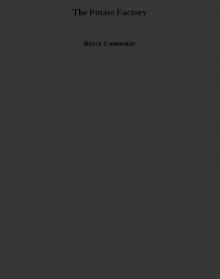 The Potato Factory
The Potato Factory The Power of One
The Power of One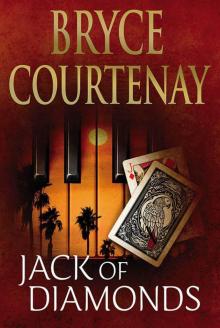 Jack of Diamonds
Jack of Diamonds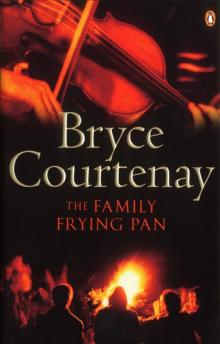 The Family Frying Pan
The Family Frying Pan April Fool's Day
April Fool's Day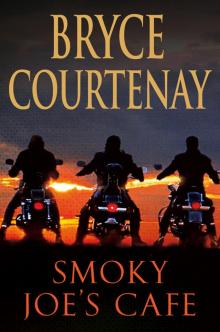 Smoky Joe's Cafe
Smoky Joe's Cafe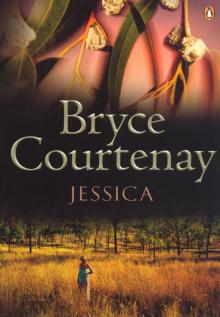 Jessica
Jessica Matthew Flinders' Cat
Matthew Flinders' Cat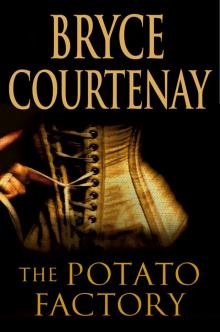 Potato Factory
Potato Factory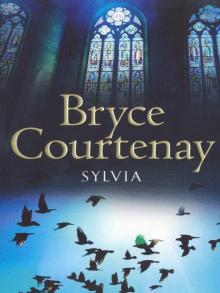 Sylvia
Sylvia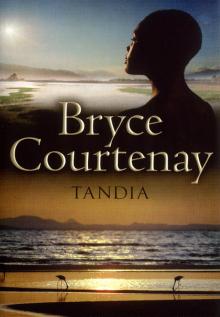 Tandia
Tandia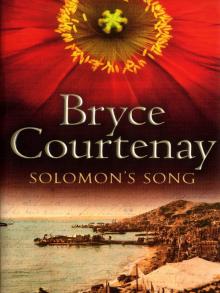 Solomon's Song
Solomon's Song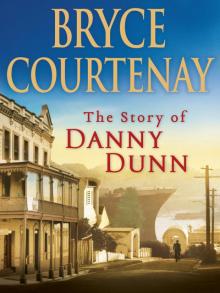 The Story of Danny Dunn
The Story of Danny Dunn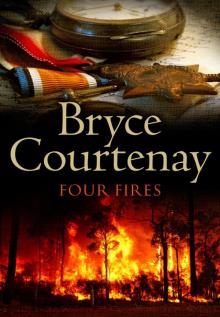 Four Fires
Four Fires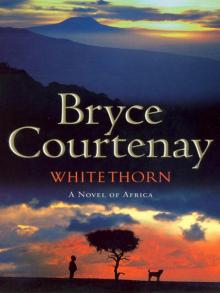 Whitethorn
Whitethorn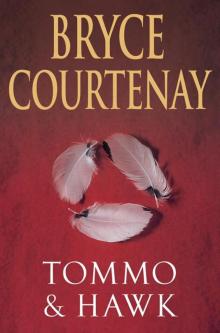 Tommo and Hawk
Tommo and Hawk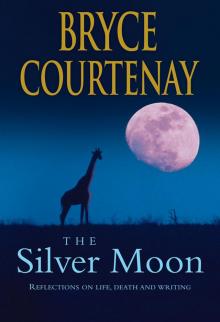 The Silver Moon
The Silver Moon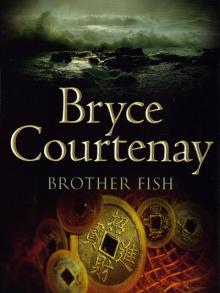 Brother Fish
Brother Fish FORTUNE COOKIE
FORTUNE COOKIE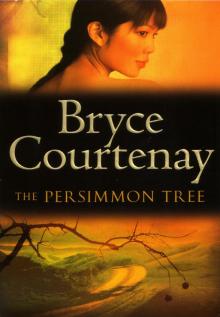 The Persimmon Tree
The Persimmon Tree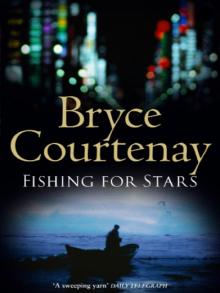 Fishing for Stars
Fishing for Stars